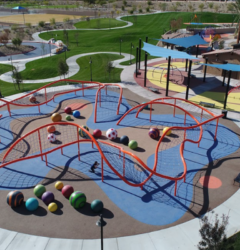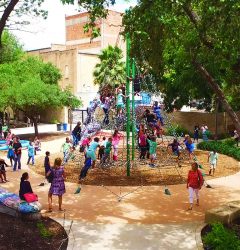26 Oct

A playgroup is a meet-up for parents/caregivers and their children to engage in relaxed play environments, generally for young child or for those who haven’t yet started school.
In our home, Monday is playgroup day at the park, and Tuesday is playgroup day at the library. For an hour or two, our two-year-old ignores all the other kids while they play with all the new toys they’ve just discovered. As parents of a two-year-old, this felt a bit frustrating at first. Why are we dragging ourselves to these playgrounds if we still have to be the sole entertainment? What’s the point?
Well, flash forward a few weeks and suddenly our child was engaging with others. Making some eye contact, sharing some toys, and learning that you don’t actually need to leap out of the way when another child approaches.
This is a main point of playgroups. It takes time, and it takes exposure. Sure, there are some kids who are naturally more extroverted. Have you ever run into a child who just won’t stop talking? Probably not the introvert of the group! However, for the toddler who is more introverted, they may need time to warm up, and to observe before they dive into the concept of playing with others.
It’s also an age where separation anxiety can be extreme, especially for children who aren’t in daycare, or are not used to being away from their parents or caregivers. Children can socialize while still feeling safe.
Playgroups can be a great way to help expose them to other children their age. Engaging in play, even just with other kids in the same area, can help them build on their social development. Check out some different playgroups in your area – churches, community groups, or your local cafes can be great resources for finding activities like playgroups. Local parent groups on social media can be a great way to help fill your toddler’s social calendar, too.
Having difficulty finding a playgroup that you love? Start your own! Here are a few tips and questions to ask for setting up a successful playgroup in your community:
- Pick a time and date and try to stick to that. Consistent timing makes it easier to remember and becomes part of a routine for parents and caregivers.
- A few hours is often long enough to cover the overlap of schedules, which allows parents to come late or leave early, if needed.
- A group of 4-6 children tend to be just the right amount. Too many can great a lot of chaos and can overwhelm young children who do not function well when overstimulated.
- Are you bringing some communal toys, or should each parent bring some to share?
- Remind parents that favourite toys are best left at home to reduce conflict.
- Will you rotate locations or stick to the same playground?
- Is there an indoor spot for bad weather?
- Ask parents to identify any allergies or request that it be a “snack-free” zone if there are worries about sharing food.
- Stay home if you’re sick! The playground can still be enjoyed while your child is sick – in fact, the fresh air and exercise can be helping in reducing their symptoms, but it may be best to avoid it during peak play times. Skip the playgroup if you or your child feels ill.
Some playgroups are organized with weekly themes, or activities. This can also be a great way to do a trial run to see what works best or what is the most engaging for the group. Rotate a schedule of an art, a sport, and then free play; or story time, sport, art. Whatever you decide can help set the tone for the playgroup and help parents decide if it’s something that may interest their child. Seek parent volunteers to help come up with creative ways the group can play together.
Whether it’s at a playground, or taking turns in each parent’s backyard or homes, a playgroup is a great way for your child to try different activities, in different settings, with different children other than their usual cohorts (daycare, siblings).
In some areas, you will find support groups that run specific playgroups. For example, newly arrived or refugee families, teenage parent families, or autism spectrum support groups may offer facilitator-led playgroups that involve specific tips and tricks for each scenario. If this is of interest, checking out the websites of your local resources may help find playgroups near you.
Playgroups aren’t just to benefit the children. Beyond finding playmates for your child, playgrounds can expand your social circle of parents who understand the toddler and preschool life. It’s a great way for parents and caregivers to make new friends, share tips and experiences, and to learn more about the people in your community.









Follow Dynamo Playgrounds